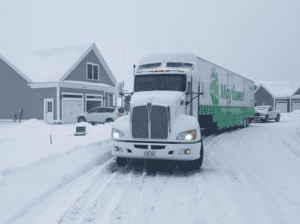 While many find summertime ideal for moving (hello sunshine and summer vacation!), those relocating for a new job or people without children often choose to move in the winter months to take advantage of lower moving rates. However moving in winter also has it’s disadvantages! Be prepared for you winter move with these reminders:
While many find summertime ideal for moving (hello sunshine and summer vacation!), those relocating for a new job or people without children often choose to move in the winter months to take advantage of lower moving rates. However moving in winter also has it’s disadvantages! Be prepared for you winter move with these reminders:
Watch the Weather
- Do a bit of research ahead of time so you can be prepared with the average daily temperature and weather forecast.
- While driving, avoid cruise control and try to refuel before you hit a quarter tank of gas. Remember, when you’re unsure of driving conditions, it’s always better to be cautious and go a little slower.
- Before you start unpacking into your new home, stop by the store and pick up rock salt or sand to throw down on walkways, driveways, and even your roadside parking spot so you can help prevent accidents and injury.
Vehicle Maintenance
- Cold conditions can be problematic for your vehicle, so make sure to check in with your mechanic before heading out. Although regardless of your travel plans and what season it is, it’s always a good idea to schedule time with a mechanic to make sure your car is good to go! This also means having a stocked first aid kit, and a small road kit easily accessible in case you need to stop or go off the road. The road kit should include a window scraper, reflective triangles, flares, flashlights, and maybe even a foldable shovel!
- If you’re not used to snow and ice and you’re moving somewhere with winter-y conditions (even if you’re just driving through on your way elsewhere), consider purchasing tire chains. Sometimes the weather forecast is off- don’t be unprepared for sleet, snow, and ice on the roads. Keep your chains accessible, just in case you need to pull over and put them on.
- Once you get to your destination, and you’re unpacked and settled in, don’t forget to take the time to run your vehicle through a car wash, or wipe it down when it’s in the garage. Salt from highways and roads can cause corrosive damage if it’s not taken care of.
- Don’t forget to update your AAA and car insurance information!
Home Inspection
- When you get to your new home, be wary of any unusual sounds, odors, damp walls, or persistent plumbing problems. You could be dealing with frozen or burst pipes! Check for bulging “python” spots, and make note of the size (length of pipe). Ideally you should call a plumber to handle the thawing process, although in the meantime you should turn off the water (if you can), and be prepared with a bucket and towels for clean up as the troubled spot thaws out. Be sure to make a note of all questionable piping or wall areas, and compile any questions you might have for your plumber.
Wishing you the best of luck on your new adventures!
Sorensen Moving & Storage
